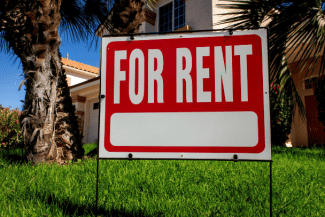The Right Way to Handle a Rent Increase
How to Reduce Complaints About a Rent Increase
The majority of tenants are aware that the housing market fluctuates, and inflation reduces the buying power of a dollar. With this knowledge, they also know to expect a rent increase.
However, as a property owner, it’s up to you to understand the landlord-tenant laws regarding how and when you can perform a rental increase.
The best policy is to create a rent inflation process and communicate it with your tenants when signing the agreement. However, if you haven’t established a procedure and want to know how to issue a rent increase without complaint, continue reading.
Conduct Market Research to Determine Rental Increase Percentage

Without determining what the average rent increase is in your area, you run the risk of raising the rent too high and potentially lose a good tenant. Conversely, without performing a rent increase calculation, you may not increase the rent enough to sustain your business, cutting into your bottom line and pushing a profitable endeavor into the red.
You can find the current rental market rates easily by speaking with real estate agents, online rental advertisements, and your property manager.
What is the Average Rent Increase Per Year?
The average rent increase percentage per year lies between three percent and five percent. Currently, the average monthly rent for an apartment in the United States is $1,500. By following the average annual rent increase, a tenant’s rate should rise by $45 to $75 every month.
The majority of landlord-tenant contracts are written as yearly obligations broken into 12 installments. For example, if the tenant has agreed to pay the U.S. average of $1,500, the contract is drafted as if indebted to $18,000 annually. With a rent increase of three percent, the contract will be updated to reflect an obligation of $18,540 per year. If the rent was raised by five percent, then the tenant will need to pay $18,900 annually.
This example uses the average rental costs nationwide and the average rent increase per year. However, you will need to tailor these figures to your specific area and the size of your rental property.
When Can You Raise the Rent?
As a landlord, you must follow certain regulations. One of them is knowing when you can legally issue a rent increase notice.
The most common time you can raise the rent is when the lease agreement has expired and the tenant is planning on staying in the rental unit. If your property falls within the regulations of rent-control, you will need to adhere to the rent-control laws that dictate the amount of a rent increase, when you can increase it, and how you need to communicate it. The local law will also dictate if you need to draft a new lease or rental agreement or if a letter of understanding will suffice.
If you decide on a rent increase mid-lease, you can expect, at best, an unhappy tenant or, at worst, a legal battle.
Note: You can’t issue a rent increase as a form of retaliation or discrimination. This legal standing exists to defend tenants who are exercising their legal rights, such as making a complaint to a public authority concerning defective conditions in the house or apartment. If you raise the tenant’s rent as a form of punishment, they will have legal grounds to sue.
Rent Increase: Reasons to Raise the Rent of Properties
Choosing to be a landlord is a business endeavor, and as a business, you need your model to be profitable. You may have various reasons to increase a tenant’s rent, most of them resulting in offsetting increasing overhead costs.
Some of the most common reasons to issue a rent increase include:
- Inflated property taxes
- Increase of insurance premiums
- Higher HOA or apartment associations dues
- Elevated utility bills
- Inflated cost-of-living standards
- Necessary repairs and maintenance expenses
Without accounting for these factors, a profitable rental unit can quickly turn from an asset to liability.
How to Handle a Rental Increase
The housing market has caused rent to increase drastically over the past decade. According to the Bureau of Labor Statistics, the average rent in the U.S. has increased by more than 30 percent since 2010. As the demand for housing increases, the market increasingly favors landlords.
While the rental market may favor landlords, keep in mind that the market can vary significantly, even within city limits. To avoid tenant turnover due to a rent increase, you need to study the current trends in the neighborhood to make sure you’re offering competitive prices.
When deciding to raise the rent, keep these things in mind. They will help to guide you so you know if you’re handling it correctly:
Local Housing Laws
Familiarize yourself with the local housing laws of your rental unit to ensure you’re complying with any rent control regulations.
Local Market
By reviewing local rental advertisements and speaking with your property manager, you can determine if rent is rising for similar units. If rental prices are trending upwards, you can comfortably raise the rent on your tenants when their lease is up for renewal.
Review Your Cash Flow
While your expenses to operate your business may be increasing, you still need to gauge the local market to determine the average annual rent increase.
Communicating Rental Increases with Tenants
It is usually prescribed by state law or listed in the lease agreement when and how you can issue a rent increase. Even if you have a month-to-month tenant, many jurisdictions will still require a minimum of 30 days’ notice when raising your tenant’s rent.
Even if you are on friendly terms with a tenant, it’s best to issue a written notification to inform them that you plan to increase the property’s rent. In many regions, local laws may require formal notification.
By sending a written notice, you can provide detailed information on the rental increase, such as the amount and date of effect. You can also alleviate any potential confusion or misunderstandings as to when the rent increase takes effect.
You can also use this notification as an opportunity to address any future changes in policies, such as payment delivery, late fees, and contact information. However, before sending the notice, check with local regulations to ensure it’s in compliance.
It’s common practice to send the notice 90 days before your tenants need to renew the rental agreement. Sending the notice this far in advance will give the tenant time to prepare for the rent increase and make any necessary changes to their budget.
You can also use this early delivery to your advantage by getting the tenant to secure a new lease early. One marketing technique that a landlord can use is to offer a discount on early renewal.
For example, you can inform your tenants that they should expect a rental increase of five percent to renew the lease, but you are willing to drop the increase down to three percent if the tenant renews 60 days before their lease ends.
This incentive may get the tenant to renew early, as they’ll be saving hundreds of dollars a year. Additionally, you’ll reduce tenant turnover, saving you money in the long-run.
However, if the rent increase is outside the tenant’s means, an early notice will likely urge them to inform the landlord that they plan on moving out. Knowing that the unit will be vacant in 90 days gives the landlord time to market the space to avoid unnecessary vacancies.
How to Raise Rents without Complaints
Most tenants understand that as the price-of-living changes, the costs are shared across the community, including the landlord. If they’re happy with the rental unit and haven’t had any issues with the management, then many will understand a small raise in rent.
However, while tenants should expect rent increases in the current housing market, it’s not uncommon for tenants to become indignant. In these cases, you can use methods to ensure the process goes over as smoothly as possible.
If they question why you’re raising the rent, you can explain to them the concept of overhead expenses. Unless they’ve also owned property, they may be unaware of increases in property tax, insurance premiums, and utility bills.
By explaining the costs that go into property ownership (while also delivering on any promises regarding maintenance and amenities), you can ease the tension with your renters as they understand the necessity of the rent increase.
If they understand the need for a rent increase but are concerned that the amount is too high, you will have to explain the market situation. It’s not your duty to show the tenant the price range of local listings. However, if you show that your rental fee is competitive, you can begin to assuage their hard feelings.
Contact AAOA
Choosing to proceed with a rent increase doesn’t have to be difficult. When you hire an experienced property manager, you’ll have someone on your team who is well prepared to draft rental agreements and communicate the need for a rental increase to tenants. Contact the American Apartment Owners Association and learn how you can maximize your rental unit today.















 Accessibility
Accessibility